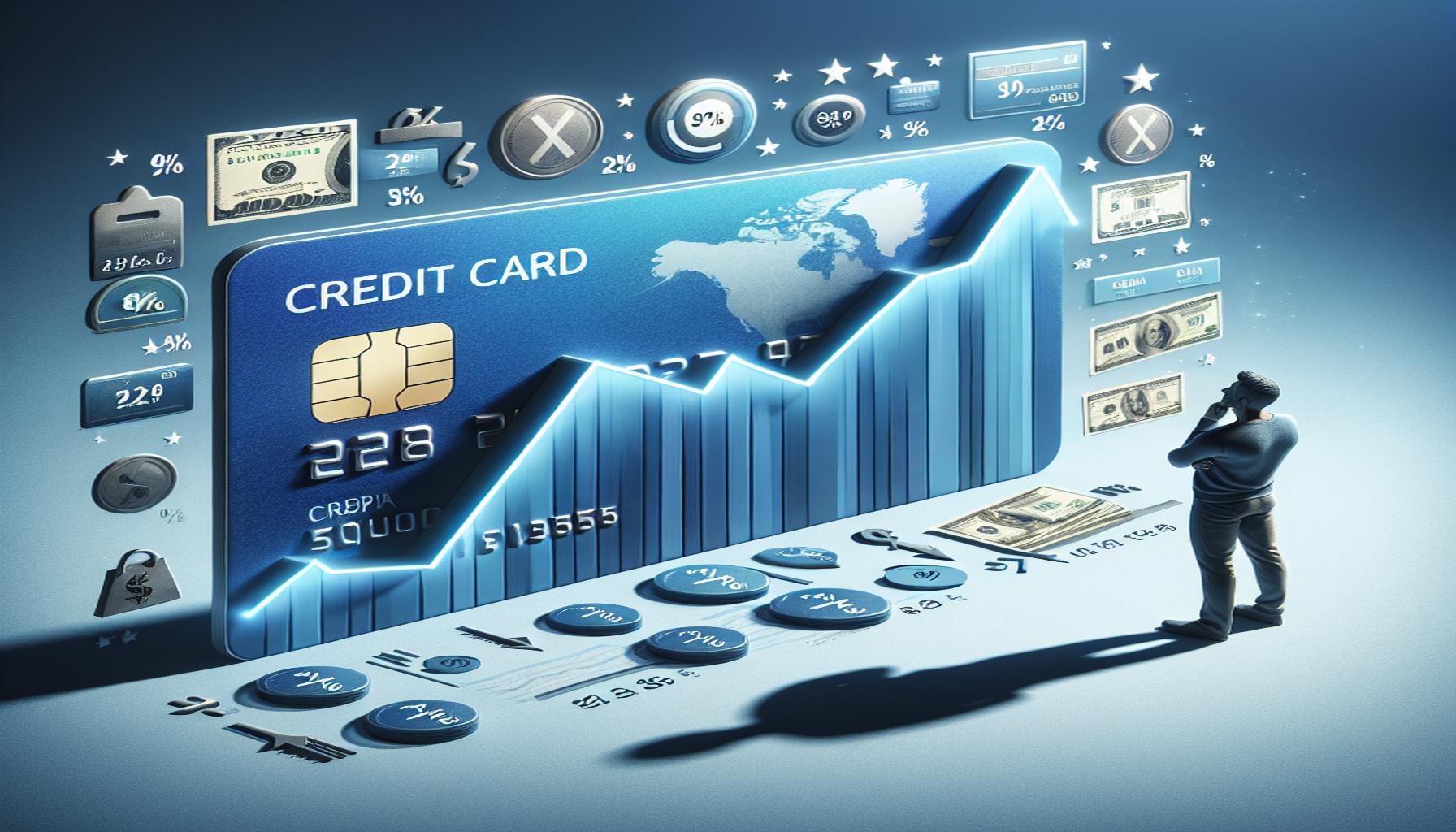How Credit Cards Affect Your Credit Score

Understanding the Impact of Credit Cards on Your Credit Score
Credit cards are not only tools for making purchases; they are also vital components of your financial standing, particularly when it comes to your credit score. Grasping how credit cards impact your credit score is crucial for making sound financial decisions and maximizing your financial potential.
Let’s delve deeper into the significant ways credit cards influence your score:
- Payment History: Your payment history accounts for a considerable portion (about 35%) of your credit score. This means that making timely payments on your credit cards is essential. For instance, if you miss a payment, even by just a day, it can lead to a noticeable dip in your score, making it harder for you to secure loans in the future. Conversely, consistently paying on time can enhance your score and prospects.
- Credit Utilization: This ratio indicates how much of your available credit you are using. It’s determined by dividing your total credit card balances by your total credit limits. As a rule of thumb, keeping your utilization ratio below 30% is advisable. For example, if you have a total limit of $10,000 across all cards, aim to keep your total balances under $3,000. High utilization signals to lenders that you may be over-relying on credit, which can harm your score.
- Length of Credit History: Lenders favor a long and stable credit history. The age of your accounts makes up approximately 15% of your credit score. Keeping older accounts open—even if you’re not using them—can positively affect your score. For example, if you’ve had a credit card for over ten years and keep it in good standing, it showcases your reliability.
- Types of Credit: Having a diverse range of credit types, including revolving credit like credit cards and installment loans (like car or personal loans), can benefit your score. This variety demonstrates to lenders that you can manage different forms of credit responsibly.
- New Credit Applications: Every time you apply for a new credit card, a hard inquiry is placed on your credit report. While a few inquiries may not significantly harm your score, too many within a short time can suggest that you are a financial risk. Maintaining a strategy of only applying for credit when necessary is wise.
Effectively managing your credit cards offers more than just ease of transactions; it is a fundamental strategy for cultivating and preserving a robust credit score. This score can influence various aspects of your financial life, from obtaining a mortgage at a favorable interest rate to qualifying for lower premiums on insurance.
It is important to develop healthy credit habits, such as paying off your balance in full each month, avoiding unnecessary applications for new cards, and monitoring your credit score regularly. By doing so, you can navigate your financial future with confidence and achieve your goals more readily.
Key Factors of Credit Card Management and Your Credit Score
To fully appreciate how credit cards influence your credit score, it’s crucial to examine the various factors associated with credit card use. Understanding these elements will empower you to make better decisions that benefit your financial health.
Payment History: The Cornerstone of Your Score
Your payment history is the most significant factor affecting your credit score, comprising approximately 35% of the total score. Missing a payment, even by just one day, can result in immediate negative consequences. For instance, if you have a credit card bill due on the 15th and forget to pay until the 16th, that missed payment can stay on your credit report for up to seven years. This negative mark can lower your score substantially, making it essential to set reminders or automate payments to ensure punctuality. On the flip side, consistently paying your bills on time is one of the best ways to build a strong score, showing lenders that you are reliable and responsible.
Understanding Credit Utilization: The 30% Rule
Another essential factor is credit utilization. This term refers to how much credit you are using compared to your available credit limits. Ideally, you should aim to keep your utilization ratio below 30%. For example, if you have two credit cards with a total limit of $10,000, it is advisable to keep your combined balance under $3,000. Keeping your utilization low demonstrates to lenders that you are not overleveraging yourself, which enhances your creditworthiness.
Length of Credit History: A Measure of Stability
The length of your credit history accounts for about 15% of your credit score. Lenders prefer to see a long-standing relationship with credit. Having older accounts in good standing can work to your advantage. For instance, if you have held a credit card for 15 years, it signals to lenders that you have a reliable track record of managing credit. If you no longer use an old credit card, consider keeping it active by making occasional purchases and paying them off to maintain that history.
Types of Credit: Variety Matters
Research indicates that having a diverse credit mix can be beneficial for your score. This means holding various types of credit, such as revolving credit (like credit cards) and installment loans (like car loans or mortgages). A varied credit profile may showcase your ability to manage different obligations responsibly, which is looked upon favorably by lenders.
New Credit Applications: The Caution Zone
Every time you apply for a new credit card, a hard inquiry is recorded on your credit report. While a single inquiry might not significantly impact your score, multiple inquiries within a short timeframe can raise red flags for creditors, suggesting that you might be experiencing financial distress. It is prudent to limit the number of new credit applications to only when absolutely necessary.
Understanding these aspects of how credit cards affect your credit score equips you with the knowledge needed to build a healthier financial profile. By making informed choices about credit management, you set yourself up for opportunities such as lower interest rates on loans and increased chances of securing credit when you need it most.
Additional Elements That Influence Your Credit Score
While payment history, credit utilization, length of credit history, types of credit, and new credit inquiries are pivotal factors in determining your credit score, several other aspects come into play as well. These factors can significantly affect your overall credit health and are crucial to consider while managing your credit cards.
Impact of Closing Credit Cards
Many individuals may feel inclined to close credit card accounts, especially those that they no longer use. However, this can adversely affect your credit score. When you close a credit card, you reduce your total available credit, which can lead to an increased credit utilization ratio if you carry balances on other cards. Moreover, closing an older account can shorten your overall credit history, which is a valuable component of your score. If you have an old credit card with no annual fee, consider keeping it open. Just make occasional small purchases to keep the account active.
How Credit Card Issuer Policies Influence Your Score
Your credit score can also be influenced by actions taken by your credit card issuers. For instance, if a credit card company decides to reduce your credit limit due to inactivity or internal policy changes, your credit utilization ratio could be negatively impacted. It’s important to actively manage your accounts, ensuring that there is consistent usage and timely payments. Regularly reviewing your account statements can help you catch these changes early and either adjust your credit use or contact the issuer for reconsideration.
The Role of Credit Reporting Agencies
In Canada, the three main credit bureaus—Equifax, TransUnion, and Experian—collect and maintain your credit information. Each agency may have slightly different credit scoring models, which can result in variations in your scores across different platforms. It’s essential to monitor your credit reports periodically, ensuring that the information is accurate. You are entitled to a free credit report from each bureau once a year, and identifying discrepancies early can help you resolve issues before they impact your score.
Credit Scoring Models: Understanding the Variations
While the FICO score is widely recognized, the credit industry also uses other scoring models like VantageScore. Both have different algorithms and may weigh various factors differently. For instance, while FICO might emphasize payment history more heavily, VantageScore could take into account recent credit inquiries to a greater extent. Understanding which score your lenders use can aid you in strategizing your credit management efforts. Always inquire about which scoring model your potential lender checks to gain insights into how your behavior may affect your likelihood of receiving credit.
The Importance of Regular Credit Monitoring
Regular credit monitoring can prove to be invaluable, as it allows you to track changes in your score and any potential fraud. There are various services available that provide alerts about changes in your credit report, which can prompt immediate action if you notice inaccuracies or suspicious activities. By being proactive, you can maintain a healthy credit profile and make decisions, such as applying for new credit cards or loans, with confidence.
By staying informed on these additional elements of credit management, you can develop a broader understanding of how credit cards affect your credit score. This knowledge not only empowers you to maintain a respectable credit score but also equips you to navigate the financial landscape more strategically.
Conclusion
In summary, understanding how credit cards affect your credit score is essential for anyone looking to manage their financial health effectively. Your credit score is mainly influenced by factors such as payment history, credit utilization, and the length of your credit history. However, additional considerations like the impact of closing accounts, the policies of credit card issuers, and the role of credit reporting agencies also play a crucial role.
Make sure to maintain a healthy credit utilization ratio by keeping your balances low relative to your available credit. Additionally, consider holding onto older credit accounts, even if they’re not in regular use, to bolster your credit history. Regularly monitor your credit reports for accuracy and be aware of the different scoring models that lenders may use, as this understanding can help you make informed decisions about your credit management strategy.
By equipping yourself with this knowledge and practicing mindful credit use, you can improve your credit score over time and enhance your financial opportunities, whether you’re applying for a loan, renting an apartment, or making a significant purchase. Remember, a strong credit score opens doors, but it requires ongoing attention and responsible habits to maintain. Be proactive, stay informed, and you can navigate the world of credit cards with confidence.

Linda Carter is a writer and financial consultant specializing in economics, personal finance, and investment strategies. With years of experience helping individuals and businesses make complex financial decisions, Linda provides practical analyses and guidance on the World Information Now platform. Her goal is to empower readers with the knowledge needed to achieve financial success.






